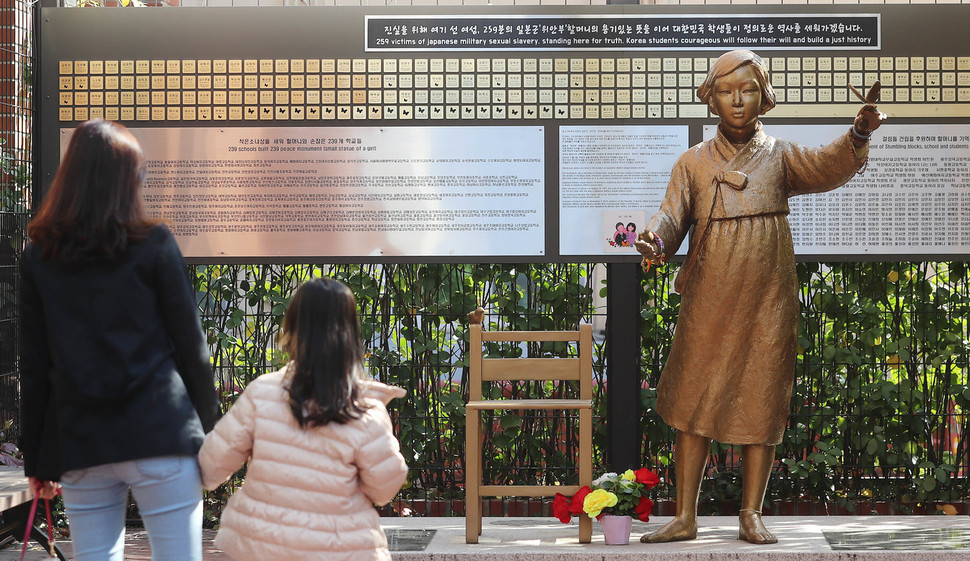 |
|
Passersby look at a comfort women memorial near the Franciscan Education Center in Seoul on Nov. 4. The memorial was erected thanks to the efforts of 46 South Korean schools, and features 259 copper plates engraved with the names of victims, including 19 residing in China, North Korea and Japan. (Shin So-young, staff reporter)
|
Documents must be delivered to Japanese court for civil lawsuit in S. Korea to begin
For the third time now, the Japanese government has refused to accept a complaint and other documents related to a damages lawsuit filed by former comfort women. The lawsuit by the elderly victims has been on hold for nearly two years now. On Nov. 27, Hankyoreh reporters learned that South Korea’s National Court Administration had given Hon. Yu Seok-dong, head of the 15th civil law division at the Seoul Central District Court, notification on Nov. 22 that documents he had sent to an overseas court had been returned. The National Court Administration explained that on Nov. 9 the Japanese Ministry of Foreign Affairs had refused to accept documents about the former comfort women’s damages lawsuit because they “infringed upon Japanese sovereignty,” adding that the complaint that the South Korean courts had transmitted via diplomatic channels had been returned to the South Korean embassy in Japan. Before the civil lawsuit can begin in the South Korean court, the complaint must be delivered to the Japanese court that is a partner in judicial cooperation according to an international convention, but the Japanese Foreign Ministry is preventing that from happening. According to regulations governing cooperation in international civil cases, the complaint must pass through the following organizations: the South Korean court in question, the National Court Administration, the South Korean Foreign Ministry, the embassy in South Korea of the country in question, that country’s relevant ministry, and that country’s court. Since the Japanese Foreign Ministry blocked the legal documents submitted by the former comfort women, they could not be delivered to the Japanese court. As a consequence, the 15th civil law division at the Seoul Central District Court, which had been planning to hold its first hearing on Nov. 28 after five delays, has delayed the date of the hearing once again. In a civil lawsuit, a trial cannot begin until the other side has received the complaint. On Dec. 28, 2016, 11 former comfort women, including Gil Won-ok, and the family members of six who have already passed away initiated a damages lawsuit against Japan, which they said had caused them psychological and physical distress by forcing them into the lifestyle of comfort women. The administration of former president Park Geun-hye reached an agreement about the comfort women with Japan on Dec. 28, 2015, one year earlier, and the victims had determined to bring attention to the crimes against humanity committed by the imperial Japanese army and Japan’s legal responsibility. Initially, the argument that a sovereign state was immune from being brought to trial in another country’s courthouse was expected to be an obstacle, but Japan’s refusal to even accept the documents has obviated any chance to deal with the question of immunity. In Apr. 2017, the Japanese government refused to accept the complaint on the grounds that it had only been sent the translation of the complaint, and not the original. Then in July, Japan refused the complaint once more for allegedly infringing upon its sovereignty, and it used the same argument to justify this refusal as well. An official from South Korea’s Foreign Ministry said that since the Foreign Ministry’s role is transmitting the documents, it did not conduct any separate deliberations with the Japanese government. “When the former comfort women filed a lawsuit in a US court, Japan didn’t refuse to accept the documents [sent by the US], so the South Korean government needs to make a diplomatic effort here, too,” said Lee Sang-hui, the attorney who is represents the victims plaintiff. By Kim Min-kyoung, staff reporter Please direct comments or questions to [english@hani.co.kr]






